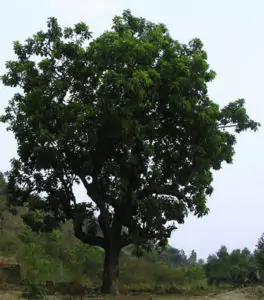Illupai Maram
The Mahua tree (Madhuca longifolia), commonly known as the "Illupai Maram" in Tamil, is a tropical deciduous tree native to the Indian subcontinent. Revered for its medicinal, nutritional, and economic value, the Mahua tree has been an essential part of rural life in India, where various parts of the tree are used in traditional remedies, food, and local industries.
Mahua trees can grow up to 18–20 meters (59–66 feet) tall and have a dense, spreading canopy. The bark is rough and dark gray, while the leaves are thick and leathery. The tree produces fragrant, cream-colored flowers in clusters, which are highly valued for their sweet nectar. These flowers are followed by green, fleshy fruits containing one or two seeds.
Uses
The Mahua tree has a wide range of uses, from medicinal and nutritional to industrial applications.
- Edible Flowers and Oil: Mahua flowers are rich in natural sugars and are often used to make sweets, jams, and traditional beverages. The seeds yield a valuable oil known as Mahua oil or Illupai oil, which is used in cooking, soap making, and as a fuel source in rural areas.
- In traditional medicine, the flowers, bark, and oil of the Mahua tree are used to treat various ailments. The flowers are known for their cooling and laxative properties, while the bark is used to manage skin diseases and wounds. Mahua oil is applied to treat joint pain, and skin conditions, and as a natural moisturizer.
- Industrial Uses: Mahua oil is often used in soap production and as an industrial lubricant. The seed cake left after oil extraction serves as an organic fertilizer, benefiting agriculture.
- Cultural and Religious Importance: The Mahua tree holds a special place in Indian culture, particularly in tribal and rural communities, where it is celebrated for its food and economic value. Its flowers are also used in certain religious ceremonies and traditional rituals.
